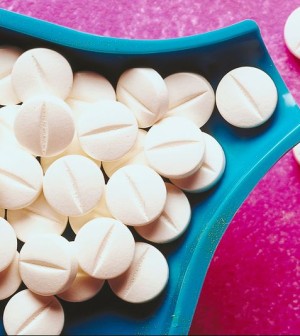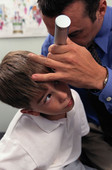- Calories, Not Meal Timing, Key to Weight Loss: Study
- Dietary Changes May Beat Meds in Treating IBS
- Screen Pregnant Women for Syphilis, Ob-Gyn Group Advises
- Even With Weight Gain, Quitting Smoking in Pregnancy Still Best for Health
- A-Fib Is Strong Precursor to Heart Failure
- One Neurological Factor Keeps Black, Hispanic Patients From Alzheimer’s Clinical Trials
- Managing Blood Sugar After Stroke Could Be Key to Outcomes
- Dozens of COVID Virus Mutations Arose in Man With Longest Known Case
- Blood Test Might Someday Diagnose Early MS
- Check Your Fridge for Trader Joe’s Fresh Basil, Linked to Salmonella
Prescription Eardrops Seem Best for Kids With Recurrent Ear Infection: Study


An eardrop that combines antibiotics and steroids might be the best ear infection treatment for children who already have ear tubes because of recurrent infections, a new study finds.
New research compared the eardrop treatment to oral antibiotics and to a wait-and-see approach. After two weeks, just 5 percent of children receiving the eardrops had continuing discharge from their ears. But 44 percent of those given oral antibiotics still had signs of infection, as did 55 percent of those managed with observation, according to the study.
“Children treated with eardrops had a shorter duration of the initial episode, and a lower total number of days of ear discharge, and a lower number of recurrences during six months of follow-up than children treated with oral antibiotics or initial observation,” said the study’s lead author, Dr. Thijs van Dongen, a physician at the Julius Center for Health Sciences and Primary Care in Utrecht, the Netherlands.
Most children experience at least one ear infection during childhood, according to the American Academy of Otolaryngology — Head and Neck Surgery. But for some children ear infections are a near-constant problem.
For these kids, small tubes — known as tympanostomy tubes — inserted into the eardrum help preserve or restore a child’s hearing. The tubes help fluid drain and allow air in the middle ear so that it can function properly.
Each year, more than a half million children in the United States have surgery to place ear tubes, according to the academy.
A condition called acute tympanostomy tube otorrhea is a common complication after the procedure. It means fluid is draining from the tube, and it may be accompanied by a foul odor, pain and fever.
The best treatment option for acute otorrhea hasn’t been well-studied, and those studies that have been done were small. For this study, published Feb. 20 in the New England Journal of Medicine, the researchers randomly assigned 230 children between the ages of 1 and 10 years old who had ear tubes to one of three treatments.
Seventy-six children were put into the antibiotic/steroid eardrop group, while another 77 children were assigned to receive oral antibiotics. The final 77 children were assigned to the observation group. After two weeks, the children’s ears were examined again.
The combination eardrops were significantly more effective than the other two practices, the investigators found.
“Next to being the most effective in treating acute ear discharge in children with tympanostomy tubes, we also found that the increase in disease-specific health-related quality-of-life scores was largest in children treated with eardrops,” said van Dongen.
Side effects were mild and no complications of middle-ear infections were reported, van Dongen added.
A study published earlier this month in the journal Otolaryngology — Head and Neck Surgery found that eardrops worked better than oral antibiotics for the painful condition known as swimmer’s ear.
However, one expert cautioned that the current study’s findings are not applicable to most children with ear infections.
“This study showed — in this very select group of kids — that eardrops were much better than oral antibiotics and much better than observation,” said Dr. Ruby Roy, a pediatrician and assistant professor of pediatrics at the University of Chicago.
Because the children in the study have ear tubes, it allows the eardrops to travel right to the source of the infection, Roy said. In kids without ear tubes, this isn’t the case, she added.
“Not using systemic antibiotics when you don’t need to means that you’ve protected this small group of kids from side effects like stomach irritation and diarrhea,” noted Roy.
It’s also known that antibiotic pills help promote resistant bacteria.
Van Dongen said he disagrees with doctors who advise parents to wait until ear drainage has gone on for a week before contacting their child’s doctor.
“We would recommend parents to contact a physician when otorrhea occurs . . . so that children can be treated with eardrops shortly after the onset of ear discharge, and improve more quickly and have fewer recurrences in following months,” said van Dongen.
More information
Learn more about ear tubes from the American Academy of Otolaryngology — Head and Neck Surgery.
Source: HealthDay
Copyright © 2024 HealthDay. All rights reserved.










